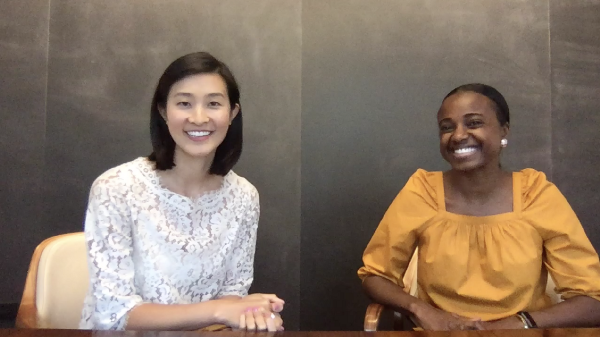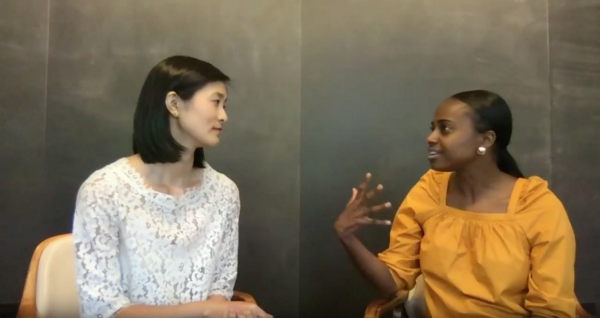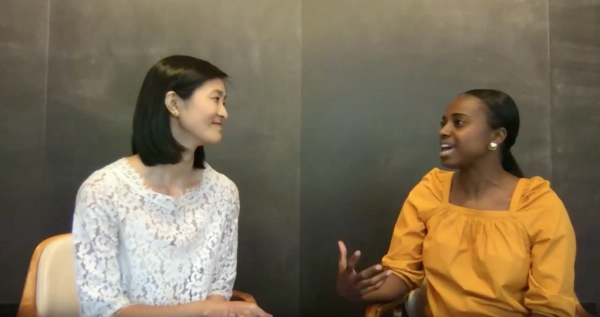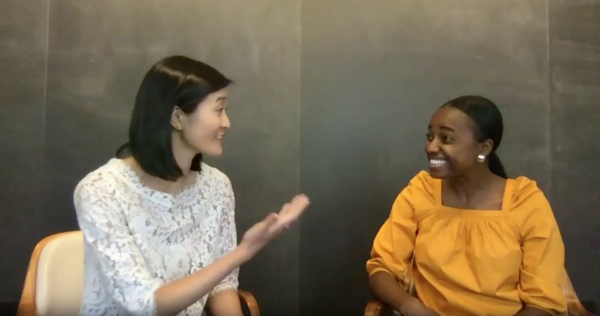As an acclaimed nonprofit leader and public speaker, Halleemah Nash reveals what “authentic leadership” really means…
Claire Lew: Hi everyone! I’m Claire Lew, and I’m the CEO of Know Your Company. Today, I am incredibly excited because I have a very special guest and dear friend with me today. I have Halleemah Nash, who is the Executive Director of iMentor Chicago.
Halleemah is someone who I look up to. I remember meeting her for the first time a few years ago and being floored by what you said, how you impress people in the room. Since then, I’ve been a big supporter of iMentor. Here in Chicago, what they do is help support high school students success for college and have since tripled their growth from serving 200 students in year one, to over a 1,000 now.
Halleemah Nash: Yes.
Claire: So Halleemah is enormously impressive. I could honestly talk about her for hours. Instead, you should go to HalleemahNash.com, read about her, watch her speak. She just recently did a TED talk, she’s published a book. Halleemah, thanks for being here.
Halleemah: Thank you for inviting me to be a part of this conversation. I think this is really cool.

Claire: Of course. I mean, you literally were one of the first people I thought about when I started doing this series and thought about this question I wanted to ask leaders.
As a leader, especially in the nonprofit world, and I know you’ve started your own consultancy in the past, you work with Nike, Kobe Bryant, Dwayne Wade. You’ve been the CEO of a foundation and now you’re the Executive Director for a nonprofit, so a lot of varied leadership experience all in the nonprofit sector.
I’ve got this one question for you, which is…
If there was one thing you wish you would have learned earlier as a leader, what would that be?
Halleemah: I would say that there is power in leading authentically. In authentic leadership and everything that that means.
I think that in the beginning of my leadership journey, there was so much that was about trying to figure out how to say the right things and how to present in the right way. This definition of what it meant to be “professional.” Being in the non-profit space, how do you ensure that you’re crafting the right message and you’re serving as a brand ambassador for your organization.
But often, you can lose yourself in that and there’s so much power in leadership, if you take what is core to your beliefs, not just core values of a business, not just the core values of the non-profit, but what are your core values? What makes you tick? What are the things that make you come alive? What do you sort of give your life to and how do you ensure that when you walk into a fundraising pitch, when you walk into a presentation, that you are walking in everything that makes you uniquely you?
It is worth all the time in the world to understand who you are before you understand how to communicate a brand or how to market a product.
Claire: Right. So that’s fascinating because I think what happens to a lot of leaders, myself included is you hear this phrase a lot which is, “Fake it til’ you make it.” So this idea that you might not know what your product is, or you might not feel 100% confident going into that fundraising pitch, but you just sort of fake or you just sort of project what you would want or project what you think the organization value’s or whatever …
How do you feel about that then? Is there a way when you’re not feeling your best or when you’re feeling imposter syndrome, how do you lead authentically in that situation?

Halleemah: Yeah, you know … And see you can’t because it’s not sustainable, right? There is a period that you can do that. That you can be an actor in a play on a stage communicating and selling something, which most sales people would say. But I think that imposter syndrome and affective authentic leadership cannot exist in the same space. So imposter syndrome will give you an opportunity to maybe get in the door, but authentic leadership is what will keep you there, right?
And what actually breaks the doors down and ensures that you can connect with people across socioeconomic boundaries across any kind of lines that we create, all of the boxes we create for ourselves. And I think imposter syndrome actually puts you in a box.
Claire: Oh yeah, absolutely.
Halleemah: It puts you in a space where you kind of have to operate in that way and it’s really intimidating to have to play a part all the time. There will reach a point where you will no longer love what you do. There will reach a point where you will become disenchanted with what you’re doing if you operate in a space where you feel like you’re an imposter or you’re acting as an imposter, right? So leading authentically and you have to define what that means for you.
Because we, now authentic is not just about how you wear your hair and how you dress at work. It’s more about just what’s core to who you are. I had to learn what authentic leadership actually meant for me. It meant thinking about how I enter the boardroom as a person that comes from a low income neighborhood and how being from a low income neighborhood taught me a level of hustle and taught me connectivity and taught me intersectionality.
You learn all of those things when you have to figure out how to turn a dollar into ten, right? You have to figure out how to survive on the bare minimum. So there was a period of time where I figured out I needed to shed those things. I needed to shed how I talked, I needed to shed sort of a lot of those things that were associated with being a low-income minority woman. Like trying to enter into these spaces where I felt like I wasn’t good enough. Enter into these spaces and be successful in these spaces where I questioned myself all the time.
And once I reached a point where I’d say, there are things that I learned as a low-income student. Navigating being a first generation college graduate. There were things that I learned going to a historically black college, being at Howard University where sometimes we match ourselves against other universities where you’re told maybe you don’t have as many resources or maybe you’re not as competitive. But I realized I was more competitive. I realized I was more prepared.
There’s this fantastic speech that Michelle Obama gave in South Carolina where she talked about all of the ways that she was taught growing up that she was enough. And that she had what it took. And then she got into schools where people would say, “You’re a black girl from the south side of Chicago. You know what that means? It means you’re not likely going to get into universities. You’re likely not going to be able to navigate the systems.” At the end of the speech she said, “You know I realize I was more ready than I could have ever imagined.”
Claire: More ready.
Halleemah: I was more ready.
Claire: More ready than you could have ever imagined.
Halleemah: And that’s what authentic leadership is. It’s like tapping into who you are and aligning it with excellence and success and all of those things that you want to achieve.
Claire: Absolutely. Well I know after you went to Howard, you spent some time at Duke, which is a very different scenario, and I can only imagine this feeling of, do I need to maybe act a different way? Do I need to put off what I think people want from me as a leader? Was there a moment or a person or something that happened to you where you saw that shift in yourself? Where you thought, “Oh, wow. I need to lead authentically if I’m going to really fell like myself and do my best work?”
Halleemah: You know, I would say that it wasn’t at Duke University-
Claire: Or maybe it wasn’t at Duke, I was going to say, maybe it was after, maybe it was before.
Halleemah: Yeah. It was interesting. It was these two very different dynamics. Going to Howard University in Washington DC and then going to Duke in Durham, North Carolina were two totally different animals. So I went from this environment that really nurtured me and really pushed me into the next level and gave me all the resources that I needed. And then Duke was the environment where it’s very cut throat. You figure out how to do this one your own. You figure out how to be the best of the best. It’s a very different environment. It wasn’t as communal for me. So operating in those two different spaces and having to navigate success, I was able to do it in both spaces, right.
So I realized that at Duke University, I was faced a little more with how different I was. I was different in terms of kind of my socio-economic background. There’s a lot of international students, right? You have African American people, you have people that come from all over the world. One of my really great friends grew up in Australia and her, she spoke fluent Chinese. And I’m at Howard and I barely have functioned with Spanish from what I learned growing up. There was so much diversity and then when I got to Duke, it was a different kind of diversity, right? And diversity sort of meant you were the only woman in a space. That you were the only African American in a space. So that might have meant diversity for other people, but that didn’t necessarily mean diversity for you.
So how do you elevate your voice as a voice that is important in that space? How do you ensure that you are crafting the kind of communication that reaches people that are very very different from you. And that’s really what I learned at Duke University. When I came to Chicago, when I really was faced with what does it mean to operate in authentic leadership and I would say interestingly enough, I wish I could say it was ten years ago. I wish I could say that it was five, it was a year ago.
Claire: That’s authentic to me. You’re being real. You’re being real. So thank you for leveling with us. It makes me feel a whole lot better, honestly.

Halleemah: You know, we use this phrase in Compton:
“You ain’t got to lie to kick it, right?” So I’m not going to lie to kick it in this interview.
I was a part of a fellowship called the Surge Fellowship. And it’s about elevating African American and Latino leaders in education and preparing them for a seat at the table. So it’s kind of a dual leadership development opportunity. It’s getting you to understand what I takes for that seat at the table, but it’s also you realizing that that seat at the table needs you. But it needs authentically you. I doesn’t need the imposter. It needs what you bring to the table in order for us to really talk about education reform in the right way.
So I spent 10 months listening to speakers, listening to people who spent 20 years in leadership not leading authentically and having their Ah-Ha moment. And listening to people who talked about the dangers of not leading authentically and talked about how we are all in these education spaces where we’re serving black and brown kids but what’s important in serving those kids in the right way is having people that have that shared experience that understand the importance of excellence and understand the importance of getting to that podium or sitting at that boardroom table and making decisions for those populations in a way that’s relatable and sort of represents who you are. Who you are authentically. And that was my Ah-Ha moment. Where I just was like, wait a minute. I’ve been thinking that you have to speak the way the dominant culture speaks.
If you want in a speech, if I’m talking to kids in high school, there’s a way I engage them and it’s different than the way I engage with my board. Yeah, I get that but there’s a common language that exists in both of those spaces and that’s the language of Halleemah. And I have to be very comfortable with that language because that’s where I kill it. That’s when I go in and I can fundraise, that’s when I go in and I can lead a team and I can develop culture because it’s with all of the things that make me uniquely me.
Claire: Right. It’s not fake. And you’re not trying to be someone else.
Halleemah: I’m not.
Claire: So I think what you’re describing is a very little discussed topic for a ton of leaders. So many leaders don’t like to talk about the fact that at some poin in their careers or even where they currently they’ve struggled with figuring out how to be more like themselves instead of trying to be like everyone else. As a company we look to all of our competitors and think “Oh my gosh, I got to try and be like this person in the market. Or this CEO,” or I saw this person on the 40 under 40 and this is who I have to be.”
I have a really good friend of mine who is CEO here in Chicago and he’s young. He’s not even 30 yet and he runs a venture back 40 person company. And I remember he told me, “Claire we went through a really really rough time in the company. I had to lay off a bunch of people, we almost ran out of cash, I thought I was going to have to shut the company down.”
He said it was during that time that what he would do because he was so desperate to try to feel like he mattered to try to be this picture of what he thought a leader was supposed to be. He was wearing suits all the time, he was talking in a way where he tried to make himself seem older, more important, and more formal. That didn’t help the business. That’s the interesting thing. They didn’t make more sales, they didn’t turn anything around.
It was the minute that he decided to relax, be himself, wear whatever he wanted, talk to people normally that everything turned around.
It’s funny, obviously there was some work involved there. It wasn’t just, I’m not going to wear a suit and now the business is doing better, right? There’s something there but I’ll never forget that. Because I think for anyone, whether you’re a woman, person of color, my friend white dude CEO, it doesn’t really matter. We all struggle with this internal battle of who are we and as a leader let’s make sure to stay true to that instead of just trying to be someone else.

Halleemah: And I would call out based on that comment that it’s not easy and there’s not a timeline to it. It’s not … If you are a CEO for this many years, you will be able to shed the layers and finally reach authentic leadership. Or if you read this book…
Claire: There’s always a book.
Halleemah: Right, there’s always a book. But I think that it’s putting a level of priority on authentic leadership. Ensuring that when you think about what it means for you to be successful as a CEO or an executive director as a leader that you are, however you’re leading in your company or your community. It’s saying that a priority for professional development for me is to be authentically me. Then unpacking what that actually means.
Claire: I’m taking that with me. I’m serious. I’m going to write that down. Literally right after this interview because as with anything, the things that you make a priority will actually come true.
Halleemah: Absolutely. And I’m one of those people that I’m big on prioritizing. There are a million things going on working in non-profit. I’m leading a team. I’m the external ambassador for the organization. I’m fundraising, I’m learning and making sure that I’m always up to date on what’s happening. For me, I’m always ensuring because it’s also a practice. It’s not just a goal and something that you reach. It’s not really a mountaintop.
Authentic leadership is a practice. You have to consistently exercise that muscle. So how much time am I spending?
Whether it’s a five minute meditation in the day, whether it’s ensuring that I listen to a certain podcast that’s about self-improvement and getting to the core of who you are. That has to happen on a weekly basis, because you’ll get away from it. And you’ll look up and you’ll be like, “Oh I was just here two years ago after all that hard work.”
Claire: You’re so right. That’s so refreshing to hear Halleemah. Thank you so much for sharing your wisdom with us, for being here today. And I think all of us are a little more inspired to lead authentically. Thanks.
Halleemah: Thank you, Claire.